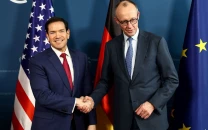Column: America is pulling back from the world
America acts - albeit deeply imperfectly - as the closest we have to a global linchpin

PHOTO: REUTERS
From an outsider's perspective, though, the way in which the United States reacts appears to be subtly shifting. Almost without noticing, America is beginning to dramatically rethink the way in which it interacts with the world.
Obama’s prediction on Pakistan not rooted in ground realities: Sartaj
As with so many things, Donald Trump is the clearest manifestation of the trend. For all his talk of "making America great again," the foreign policy he has begun to outline - particularly in interviews with senior editors at the New York Times and the Washington Post - smacks of outright isolationism.
Trump himself, it should be said, specifically rejects that label.
Getting stuck on the semantics misses the point. On a much, much broader level - from the country at large to the corridors of the White House - feelings are also changing. Frustrations, regrets and a rethinking of how much America can or should do drips from almost every line of the must-read interview with President Barack Obama published earlier this month in the Atlantic.
Speaking on condition of anonymity, several current and former US officials have told me they no longer really feel they know what their country was trying to achieve in Iraq, Afghanistan or elsewhere. Such soul-searching is rarely done publicly, but it appears widespread.
Obama offers help to eliminate terrorism from Pakistan
That trend is easily missed in Washington, not least because so many of the think tanks that makeup the foreign policy community are robustly interventionist - and funded by individuals, defense contractors and foreign governments such as the Gulf states who want to keep the US thinking that way. "The result is that you can end up taking public positions that are more interventionist than you really think," said one think tank policy analyst on condition of anonymity. Even within such institutions, though, the mood seems to be quietly changing.
The gulf between different worldviews - particularly those exemplified by Obama and Trump - remains vast. As Obama's Latin American tour made clear, his vision for America remains one in which the world's preeminent superpower remains a multiethnic melting pot deeply committed to an ever more interlinked world - even if the Atlantic profile shows he now puts more caveats on that position.
Trump's entire campaign, meanwhile, is based around - often literally - fencing off the rest of the planet. Immigration and globalisation, he says, have cost Americans their jobs and risks costing them their safety. Too many of America's allies, he says, have been relying on Washington to deter enemies and stabilize the neighborhood. If they're not willing to pay for that protection, Trump says, America should pull its forces back.
That's a massive shift from the positions America's allies in particular have come to expect. In South Korea, newspapers said they were "dumbfounded" by Trump's suggestion Tokyo and Seoul should build their own atomic weapons to protect themselves. European governments will be similarly concerned by his comments on NATO. In both cases, though, his comments point to much broader questioning at home.
Instability will continue in many parts of world, including Pakistan: Obama
Earlier this month, I chaired a discussion on US foreign policy and the election. One of the participants, the Atlantic Council's Alex Ward, mentioned that while he and many of his foreign policy-focused colleagues spent much of their time working on strategies to defend NATO members like the Baltic states from Russia, some of his relatives in the rest of the country didn't even know what the acronym stood for.
Ipsos pollster Julia Clark, meanwhile - who believes Trump is much more likely to win than many in the political mainstream accept - argued his more isolationist views already resonate widely with a public tired of wars and job losses. US Naval War College academic Nikolas Gvosdev argued that regardless of who wins, Trump has made such positions much more acceptable for other politicians to take in future.
When it comes to talking about the threat from militants like Islamic State, Trump and Obama also differ wildly - but only up to a point. Trump takes pride in talking about how he would tear up the rulebook, using harsh interrogation techniques, torture and indiscriminate bombing. The President might have failed to close Guantánamo but he clearly opposes such measures, feeling they simply make matters worse.
Trump's populist anti-IS message, though, contains very specific limits. Attempts at broader stabilization and "nation-building," he says, simply haven't worked. He told the Washington Post he would find it "very difficult" to send tens of thousands of ground troops to fight Islamic State, even if senior US commanders requested it.
Arms transfer: US issues notification of F-16 sale to Pakistan
Obama famously opposed the invasion of Iraq but favored increasing the number of troops in Afghanistan immediately after he took office in 2009. It's hard to imagine him or many others backing such a strategy now.
On a wide variety of issues, Trump has probably taken too extreme and idiosyncratic a position to make himself electable. America's most likely next president remains Hillary Clinton - a candidate whose legitimacy, ironically, rests heavily on her international affairs background and establishment status. Her advisers, backers and mentors consist of pretty much the entire Democratic and much of the Republican foreign policy community - although she has found that that expertise is not necessarily helping her at the polls.
In the last few years, Washington and European powers have already moved towards a much more affordable, perhaps also effective strategy for engaging volatile countries. In three nations in particular - Iraq, Afghanistan and Somalia - that approach is now clearly to provide limited military and development assistance intended to build local government structures, ideally with wider regional support.
That's a major shift from relying on an unsustainable surge of foreign forces. It does much less to radicalize regional opinion, a longer game with much greater potential for success. It could even work in Syria - at least providing the United States, Russia and other local powers could ever agree on what kind of future government they were trying to strengthen.
What is happening now, though, is a very real questioning of whether that kind of engagement is worth it.
Where Trump goes well beyond any other potential serious presidential contender since the 1930s is suggesting the much wider withdrawal, if not outright abandonment, of previous U.S. positions. On trade, he is aggressively protectionist - something he has in common with leftist challenger Bernie Sanders. Against China in particular, he says he would run up tariffs in a way that could well provoke a trade war.
At the same time, though, his reluctance to support longtime U.S. allies might well empower Moscow and Beijing. Trump says his time in business has told him the value of being unpredictable. When it comes to high-stakes nuclear confrontations, however, that may not be a virtue.
Obama would never go as far - indeed, stepping up military presence in both Asia and Europe has been central to his strategy. But he clearly saw no problem in expressing considerable frustrations with the Europeans, Britain and France in particular, blaming them for failing to come up with their own policies to stabilize Libya - in his view, clearly Europe's backyard - after the fall of Muammar Gaddafi in 2011.
US senator does not expect Pakistan F-16 sale to be blocked
In the aftermath of the Brussels attacks, the overwhelming narrative seems to have been to "blame Belgium." In some ways, that's very reasonable - Belgium's intelligence and security apparatus, as well as the rest of its government, is notoriously dysfunctional.
But Belgium, it is worth remembering, has long been known as the "crossroads of empire," never truly able to secure its borders against its foes. And while some of America's relative success in avoiding attacks on its mainland since 9/11 probably is the result of its intelligence and security reforms, the fact it is cut off from the rest of the world by two enormous oceans is also key.
That geographic isolation is why America has the luxury of sometimes thinking it could make the rest of the world go away. Indeed, much of its recent focus on gaining energy independence seems rooted in that hope.
That the United States is rethinking its role is neither surprising nor unhealthy. It spent a mere 25 years as the unipolar global superpower and in the Middle East in particular, it's easy to conclude it may have been a negative - or at least de-stabilizing - influence.
At its best, however, America acts - albeit deeply imperfectly - as the closest we have to a global linchpin. If the country is going isolationist again during a period of global instability, that may not be a good thing for the rest of us.



















COMMENTS
Comments are moderated and generally will be posted if they are on-topic and not abusive.
For more information, please see our Comments FAQ